Can Fleas Make Dogs Sick? The Dangers and Diseases to Watch Out For
Fleas may seem a mere annoyance, but they pose a significant threat to the health and well-being of our beloved dogs. Common symptoms of flea-related illness in dogs are:
- Scratching and Itching: Excessive scratching, biting, or licking of the skin is a common sign of flea infestation. Dogs may be visibly uncomfortable and restless.
- Hair Loss: Fleas can cause hair loss, particularly in areas where they are most active, such as the base of the tail, back, and abdomen.
- Skin Irritation: Flea bites can cause redness, inflammation, and irritation on the skin. Dogs may develop small bumps or sores, and secondary bacterial infections can occur in severe cases.
In this blog, we will explore the importance of flea protection and highlight the potential dangers that fleas bring to dogs.

Diseases and Conditions Caused by Fleas
1. Flea Allergy Dermatitis (FAD)
Flea Allergy Dermatitis (FAD) is a common condition in dogs that occurs as an allergic reaction to flea saliva. Even a flea bite can trigger a severe response in dogs with FAD. When a flea bites an allergic dog, the saliva introduces allergenic substances into the skin, leading to intense itching, inflammation, and discomfort. Dogs affected by FAD often scratch excessively, chew their skin, and may develop redness, swelling, and sores. The constant scratching can break the skin, making dogs susceptible to secondary bacterial infections, further complicating the condition. It’s crucial to address FAD promptly by eliminating fleas and providing appropriate veterinary care to relieve the dog’s discomfort.
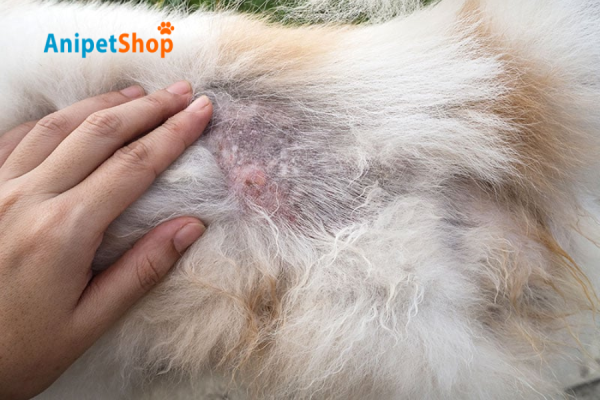
2. Tapeworms
Fleas can serve as intermediate hosts for tapeworms, a type of intestinal parasite. Dogs can become infested with tapeworms by ingesting fleas that carry tapeworm larvae. When a dog ingests an infected flea during grooming, the tapeworm larvae are released into the dog’s intestines, which develop into mature tapeworms. The presence of tapeworms can cause various symptoms in dogs, including weight loss, poor appetite, diarrhea, and irritation around the anus. Owners may also notice small, rice-like segments of the tapeworms in the dog’s feces or around the anal area.
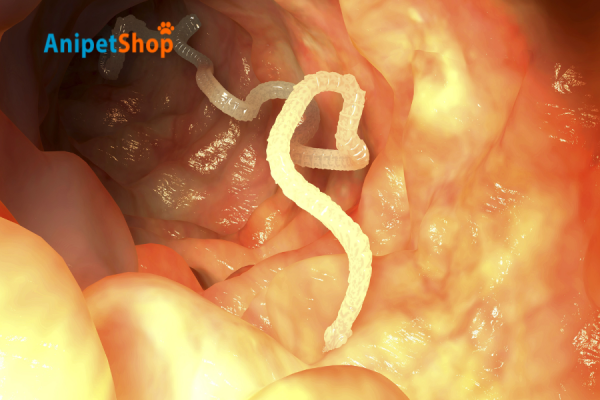
3. Anemia
Severe flea infestations can lead to anemia in dogs, particularly in puppies and small breeds. Anemia occurs when there is a significant loss of red blood cells, and fleas, as blood-sucking parasites, can cause substantial blood loss over time. Constantly feeding fleas in a dog’s blood can result in anemia, leading to symptoms such as pale gums, weakness, lethargy, decreased appetite, and even fainting. Puppies and small dogs are particularly vulnerable to developing severe anemia from flea infestations. It is crucial to address flea infestations promptly to prevent the risk of anemia and provide appropriate flea control measures to protect the dog’s blood health.
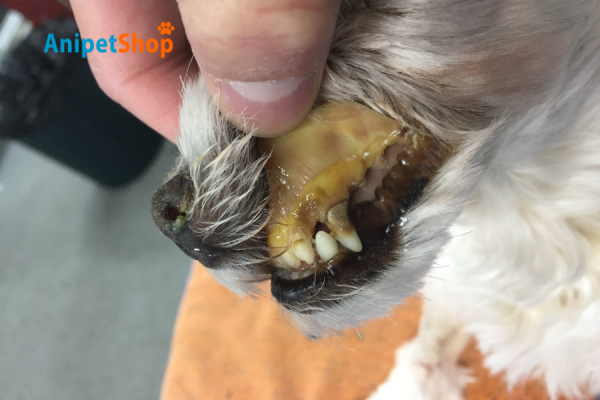
4. Bartonellosis (Cat Scratch Disease)
Fleas can act as carriers of Bartonella bacteria, which can cause a disease known as Bartonellosis or Cat Scratch Disease in dogs. When an infected flea bites a dog, it can transmit the bacteria into the dog’s bloodstream. Bartonellosis can lead to various health issues in dogs, including fever, lethargy, swollen lymph nodes, joint pain, and eye inflammation. It can affect organs such as the heart and liver in severe cases. While the name suggests that cats are the primary source of this disease, fleas play a crucial role in transmitting the bacteria. Proper flea control measures are essential to prevent flea infestations and reduce the risk of Bartonellosis in dogs.
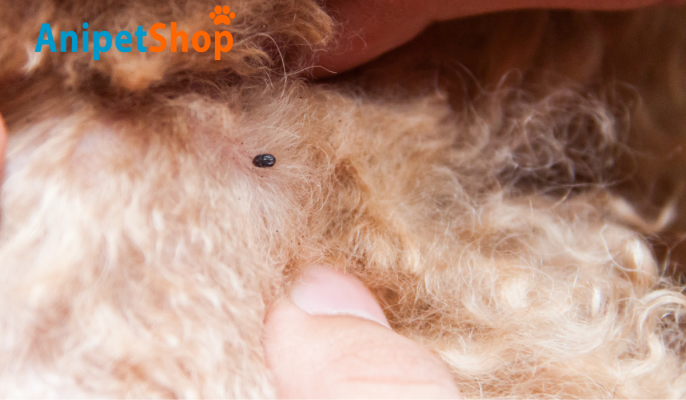
Signs Your Dog Might Have Fleas
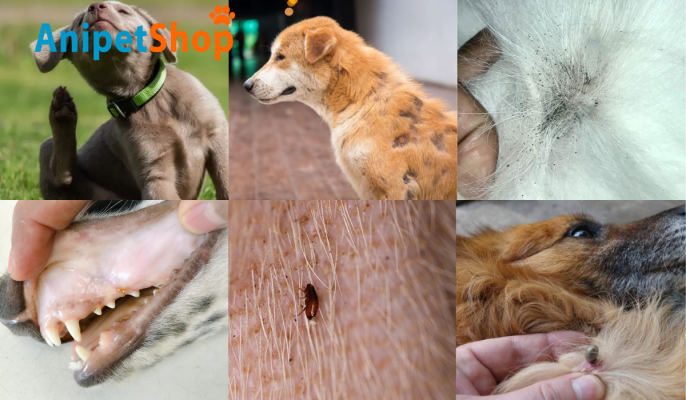
Fleas are a common parasite that can infest dogs. If you suspect that your dog may have fleas, here are some signs to look out for:
- Excessive scratching and biting: Dogs infested with fleas often exhibit intense itching and may scratch or bite at their skin excessively. They may focus their scratching on specific areas, such as the base of the tail, back, or abdomen.
- Hair loss or bald patches: Fleas can cause hair loss in dogs, particularly in the most active areas. Infestations can result in thinning hair, bald patches, or a dull coat. Pay attention to changes in your dog’s fur quality or areas of noticeable hair loss.
- Flea dirt (dark specks in fur resembling pepper): Flea dirt, the feces of fleas, is a common sign of infestation. It appears as tiny dark specks in the dog’s fur and resembles pepper or tiny grains of dirt. To check for flea dirt, comb your dog’s fur over a white surface and look for the presence of these specks.
- Pale gums (indicating anemia): In severe cases of flea infestation, dogs can develop anemia due to blood loss. One visible sign of anemia is pale or white gums. Check the color of your dog’s gums regularly by lifting their upper lip and observing the gum color. Normal gums should be a healthy pink color.
- Visible fleas on the skin: The presence of actual fleas on your dog’s skin indicates an infestation. Fleas are small, brownish-black insects that move quickly through the fur. You may be able to spot them by parting the fur and examining the skin, especially in areas where fleas commonly congregate.
If you notice any of these signs in your dog, it is essential to address the flea infestation immediately. Early detection and treatment are crucial in preventing further discomfort and potential health complications associated with flea infestations.
How to Treat and Prevent Fleas
Treating and preventing fleas is essential for the health and comfort of your pets. Some online shops offer flea treatment medications without requiring a prescription from a vet. These online shops provide convenient access to flea treatment products, allowing pet owners to address flea infestations and protect their pets from future outbreaks. However, it is crucial to carefully research and choose reputable online shops that prioritize the safety and well-being of animals.
1. Treating and Preventing Fleas by Effective Medications
At Anipetshop, you can conveniently purchase flea treatment medications without a veterinarian’s prescription. We offer a wide range of flea treatment products for dogs and cats from trusted brands such as Bravecto, Simparica, Revolution, and more. By regularly treating your pets with these medications, you can effectively eliminate fleas and prevent future infestations, ensuring the health and well-being of your furry companions.

Here’s a table comparing the three types of flea medications: oral, topical, and collar. It includes their pros and cons, essential considerations, and brand examples.
| Medication Type | How it Works | Pros | Cons | Important Considerations | Brand Examples |
| Oral | Kills fleas after they bite and ingest medication | Fast-acting may be easier to administer than topicals | It can be less effective if the dog vomits; some require monthly doses | Not suitable for very young or old pets | Comfortis, Capstar, Bravecto, Nexgard, Simparica, Credelio |
| Topical | Absorbed into the skin, killing fleas on contact | Can provide longer-lasting protection (up to a month) | Potential for skin irritation, less effective if the dog gets wet frequently | Avoid touching the application area until dry | Frontline Plus, Advantage II, Revolution, K9 Advantix |
| Collar | Releases flea-killing chemicals over time | Convenient, long-lasting protection (some up to 8 months) | It may not be suitable for dogs with skin sensitivities, potential for the collar to be lost | It might be less effective in very humid climates | Seresto, Preventic |
In conclusion, choosing the proper flea medication for your pet depends on various factors. At Anipet, we have a team of consultants who can advise you on the appropriate medication for your pets based on their age, severity of illness, and overall health condition. We also guarantee that all our products, such as Capstar, Bravecto, Nexgard, Simparica, Credelio, etc., are 100% genuine, with no imitations or counterfeit items. We prioritize the authenticity and quality of our products to ensure the best for our customers.
2. Treating and Preventing Fleas by Controlling the Environment
Fleas don’t just infest pets, they can also spread throughout the environment. It’s essential to regularly clean and sanitize the dog’s environment to eliminate flea eggs, larvae, and pupae. This includes washing bedding, vacuuming carpets and upholstery, and treating outdoor areas where fleas may be present. Removing fleas from the environment can prevent reinfestation and break the flea lifecycle.

Grooming your dog regularly is essential to flea prevention. Regular brushing helps to remove adult fleas and flea dirt from the fur, making them easier to spot. Additionally, frequent grooming allows you to check for any signs of fleas, such as redness, itching, or tiny black specks (flea dirt). Early detection is crucial for effective flea control. You must immediately consult a veterinarian for proper treatment if you notice any fleas.
FAQs
Can I get sick from the fleas on my dog?
While it’s less common for humans to get sick directly from the fleas on their dogs, fleas can bite humans and irritate them. Some flea-borne diseases, such as flea allergy dermatitis or Bartonella infection (cat scratch disease), can also affect humans. It’s essential to take precautions to minimize flea exposure and address flea infestations promptly.
How long does it take for fleas to make my dog sick?
The time it takes for fleas to make a dog sick can vary depending on several factors. The severity of the infestation, the sensitivity of the individual dog, and the specific disease involved all play a role. Some dogs may develop reactions quickly, experiencing discomfort and itching soon after being infested with fleas. In other cases, it may take longer for symptoms to appear. Regular monitoring and prompt flea control measures are essential to help keep your dog healthy and reduce the risk of flea-related illnesses. If you suspect your dog may be sick due to fleas, it’s best to consult with a veterinarian for a proper diagnosis and appropriate treatment.
Conclusion:
Fleas can make dogs sick through various means, including allergic reactions, anemia, and the transmission of diseases. As responsible pet owners, it’s crucial to be vigilant and proactive in preventing and controlling flea infestations. By maintaining good hygiene practices, utilizing appropriate flea prevention methods, and seeking veterinary care when necessary, we can help ensure the health and well-being of our beloved canine companions. Remember, a flea-free dog is a happy and healthy dog.
Lily Watson is an author specializing in veterinary care in Australia. With a profound passion for animal welfare and a solid foundation in veterinary science, Lily has dedicated herself to disseminating valuable knowledge and information for both pet owners and professionals in this field.

